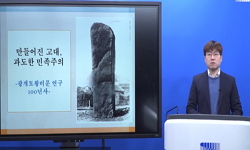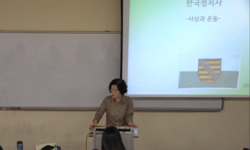This review article surveys Western scholarships on Old Choson as well as the current status of the ``Harvard Early Korea Project`` sponsored by the Northeast History Foundation and Korea Foundation. There must have been some reasons for the lack of t...
http://chineseinput.net/에서 pinyin(병음)방식으로 중국어를 변환할 수 있습니다.
변환된 중국어를 복사하여 사용하시면 됩니다.
- 中文 을 입력하시려면 zhongwen을 입력하시고 space를누르시면됩니다.
- 北京 을 입력하시려면 beijing을 입력하시고 space를 누르시면 됩니다.
구미의 한국 상고사 연구와 하버드 고대한국 프로젝트 = Early Korean History in the West and the Harvard Early Korea Project
한글로보기https://www.riss.kr/link?id=A101963427
- 저자
- 발행기관
- 학술지명
- 권호사항
-
발행연도
2016
-
작성언어
-
- 주제어
-
KDC
900
-
자료형태
학술저널
-
수록면
83-107(25쪽)
- 제공처
-
0
상세조회 -
0
다운로드
부가정보
다국어 초록 (Multilingual Abstract)
This review article surveys Western scholarships on Old Choson as well as the current status of the ``Harvard Early Korea Project`` sponsored by the Northeast History Foundation and Korea Foundation. There must have been some reasons for the lack of the scholarship in the field except for Hyung Il Pai`s Constructing Korean Origins. First of all, it is very difficult for the Western scholars, who are accustomed to the empirical approach, to have an interest in the field with such a scanty source. The space and time span of the Old Choson is still unclear as well, so that they are suspicious about the historicity of the polity before the second century B.C. The Old Choson does not seem to have been an appropriate topic for historical research in the West. In this regard, Korean government began to provide a grant in 2007 to the Korea Institute at Harvard University for the ``Early Korea Project.`` The project seems to have been successful in that they published each three volumes of Early Korea and the occasional series. The six volumes efficiently cover various important topics in Early Korean history. However, the pseudo-historians and politicians in Korea criticized the location of Lelang Commandery not in Manchuria but in the present-day Pyongyang area in The Han Commanderies in Early Korean History edited by Mark Byington, so that they forced the Northeast History Foundation to stop providing the grant. Believing the criticisms totally groundless, I hope they reconsider the short-sighted decision.
동일학술지(권/호) 다른 논문
-
- 단국사학회
- 박윤희
- 2016
-
- 단국사학회
- 김명섭 ( Myung Seob Kim )
- 2016
-
- 단국사학회
- 한시준 ( Seejun Han )
- 2016




 KISS
KISS





